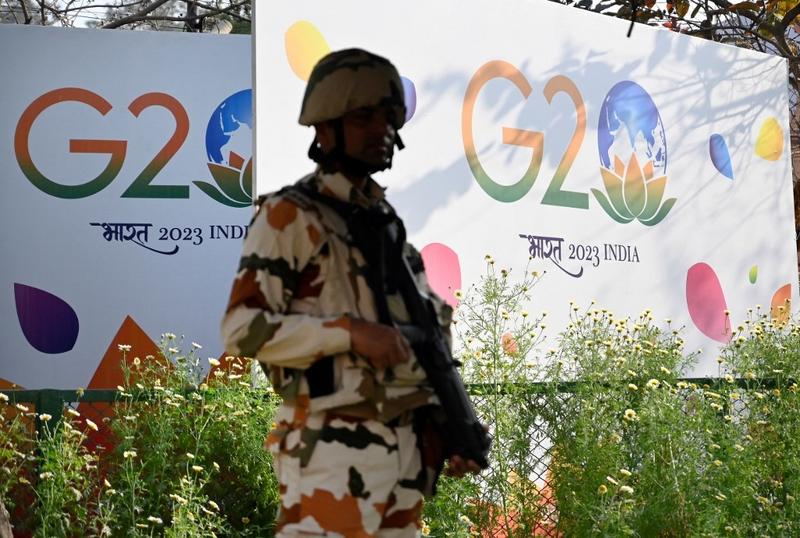 A member of the India military force stands guard inside of the G20 foreign ministers meeting in New Delhi on March 2, 2023. (PHOTO / AFP)
A member of the India military force stands guard inside of the G20 foreign ministers meeting in New Delhi on March 2, 2023. (PHOTO / AFP)
Leading economies should set aside their differences and concentrate on the needs of the developing world to weather difficulties and challenges during their recovery, a high-level G20 meeting has heard.
"We must all acknowledge that multilateralism is in crisis today," Indian Prime Minister Narendra Modi said in a recorded address to the G20 Foreign Ministers Meeting in New Delhi on Thursday. "The experience of the last few years — financial crisis, climate change, pandemic, terrorism and wars — clearly shows that global governance has failed."
India chose the theme "One Earth. One Family. One Future" for its presidency of the G20, which comprises the world's 20 largest economies. Modi said Thursday's meeting had come at a time of deep global divisions.
Subrahmanyam Jaishankar, India's minister of external affairs, said the ministers' discussions should include challenges in food security, fertilizers and fuel, which are "truly make-or-break issues for developing nations". He told his counterparts at the meeting, "Global decision-making must be democratized to have a future"
Seeing foreign ministers from the United States, Russia, India, and China come together for face-to-face discussions, and observing a one-minute silence to commemorate victims of the earthquakes last month in Turkiye and Syria, shows that major countries can find common ground and narrow the gaps between them, analysts said.
Subrahmanyam Jaishankar, India's minister of external affairs, said the ministers' discussions should include challenges in food security, fertilizers and fuel, which are "truly make-or-break issues for developing nations". He told his counterparts at the meeting, "Global decision-making must be democratized to have a future."
Thursday's agenda included sessions on food security, development cooperation, terrorism and humanitarian assistance.
Foreign ministers "must remain focused on their original mandate, that is, to work toward macroeconomic stability and inclusive growth", said Swaran Singh, a professor of diplomacy and disarmament at Jawaharlal Nehru University in New Delhi.
ALSO READ: G20: Qin calls for cooperation on multilateralism, development
He said divisions were visible at the meeting for G20 finance ministers and central bank governors a week earlier in Bangalore that failed to arrive at an agreed final communique.
Modi acknowledged on Thursday that discussions would be affected by geopolitical tensions, and he emphasized: "We must focus on what unites us, not on what divides us. We should not allow issues that we can't resolve together to come in the way of those we can. … We have a responsibility to those not in this room."
India has said it intends to utilize its G20 chairmanship to raise concerns for developing nations.
"After years of progress, we are at risk today of moving back on the sustainable development goals," Modi said. "Many developing countries are struggling with unsustainable debt while trying to ensure food and energy security for their people."
Foreign ministers "must remain focused on their original mandate, that is, to work toward macroeconomic stability and inclusive growth", said Swaran Singh, a professor of diplomacy and disarmament at Jawaharlal Nehru University in New Delhi
Global South voice
"They are also most affected by global warming caused by richer countries. This is why India's G20 presidency has tried to give a voice to the Global South."
Modi stressed that no group could claim global leadership without listening to those most affected by its decisions.
Making such an impassioned plea for countries to find ways to cooperate might make it difficult for India to uphold its nonalignment policy in foreign policy regarding the Russia-Ukraine conflict, observers say.
In addition, the anticipated effects of inflationary and recessionary trends threaten to undermine the country's early post-pandemic growth, said Singh, who is also a visiting professor at the University of British Columbia in Canada.
READ MORE: De-risking global economy high on G20 meeting agenda
He said G20 ministers and observing participants should not let their predispositions on the Ukraine crisis or any other bilateral discords distract them from building consensus on addressing real global challenges of climate change and the debt default crisis, especially among developing nations.
Instead, Singh added, they should send out a strong signal on multilateralism, food and energy security, and development cooperation so that the whole world can keep momentum toward sustainable development goals.
The writer is a freelance journalist for China Daily.
Xu Weiwei in Hong Kong contributed to this story.


